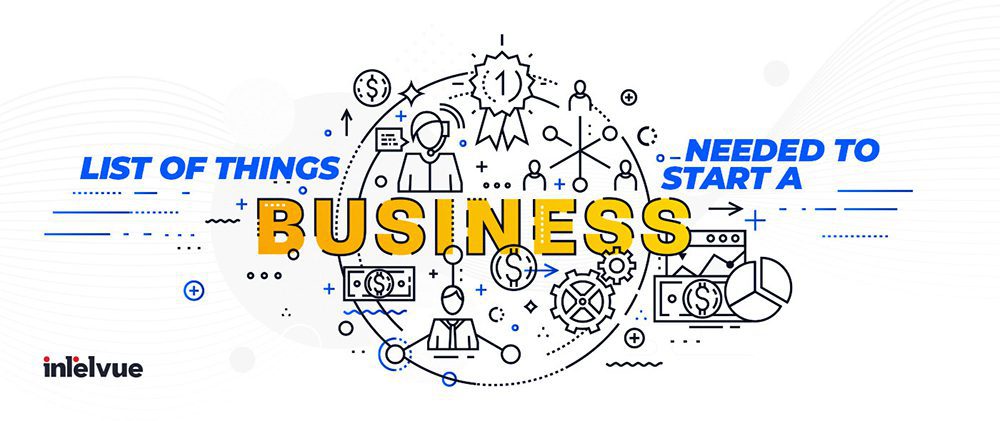
Starting a business in 2023 is both thrilling and nerve-racking at the same time, especially for newbies. It’s not as easy as falling off a log for them without a good guide. They can imagine either attaining gratifying results or suffering a monstrous loss! Besides, it all banks on their will and the essential requirements of their business.
12 Things You’ll Need to Start Your Business In 2024
If you’re one of those who wish to begin their own business but don’t know where to start – you must not miss out on our list of things that will guide you through starting your own business.
1. An Amazing Business Idea

Firstly, decide what you want to do. Let it be something different that should benefit society. But keep in mind that every unique idea is not necessarily good or practicable. However, if your idea, besides being unique, is robust and serves the people, it can do wonders! But if it has a low target audience, it will encounter issues regarding money and customers, wasting your valuable time. Your idea should be profitable and something you’re good at or passionate about.
Therefore, keep refining your idea as much as possible until it’s genuinely workable.
- Proper Market Research
Now, research your business idea and explore its market and competitors. It’s vital to know who might be fascinated by and curious about your business product or service because startups who don’t conduct adequate market research for their business suffer a mighty loss. Therefore, proper market research will help you understand your customer’s problems; what they want from the market but the market cannot provide them.
- A Plan for Your Business
When you’re done with the market research, make a plan for your business. This plan will help you define your business goals and objectives.
Mention the vision and mission of your business, strategies you’ll come up with for the market, methodologies you’ll use, and team management. In addition, your business plan should also include your company description, market analysis, products or services, marketing plan, financial plan, and executive summary. All these things will help you to analyze your business with more clarity.
4. A Good Business Mentor

You might have made the best possible plan for your business; however, you will still need a good business mentor who must be trustworthy and an expert in your field to improve your business idea and strategies. So, hire a mentor who will aid you in every process of your business and provide you with the best advice and guidance you need to start and operate a successful business.
- Suitable Source of Funds
Work out whether you’ll finance your business by yourself, ask your family and friends, or rely on investors. If you’re not experienced enough, we suggest you not invest your hard-earned money because if the business fails, it may lead to substantial wealth loss. Also, if you fear risking your relationships with your family and friends if the business goes under, don’t ask for funds from them. Instead, you can obtain funds from various sources, such as small business loans, small business grants, angel investors, venture capital, and crowdfunding.
- A Relevant Business Name
Once you’ve successfully crafted your business plan, now invent a relevant, unique name for your business that is legally accepted. You can create a name that explains your product clearly or refers to anything. For this, Google might help you.
Note that your business name should not be similar to any other registered company or trademark, as the Registrar of Companies could reject it. So, conduct a name search to know whether any company with your proposed name exists.
- A Reflecting Domain Name
When you have settled on a name for your business, purchasing a domain name that includes or reflects it is important. It will make your business more credible and authentic in your user’s eyes. So, find a reputable domain hosting service to get a domain name for your business.
To register a domain in the best way, choose the most pertinent domain extension for your business, register a few related domains, set your domain to auto-renew, and lock it.
8. A Website or Mobile App

Your business needs a mobile app or website. It doesn’t matter what your business size is – a web presence will always make a difference! Thus, you can either create a standard informational website or an E-Commerce website where you would be able to sell your products online.
If you want a professional web development company, you can consult with our robust web development team. They’ll create a fantastic mobile app or website with SEO optimization, quality content, and stunning UI/UX design at budget-friendly prices. Plus, we offer E-Commerce solutions that feature multiple payment options and are user-friendly. Moreover, you can automate your customer service with chatbots, for which you can depend on our stellar chatbot development services.
- Social Media Profiles
Promoting business online is the quickest way to reach a vast audience. In addition to a business website or app, you can create a social media profile for your business using social media platforms, including Facebook, Instagram, Youtube, LinkedIn, and so forth. There, post relevant content and upload photos and videos of your business products or services. It will aid you in getting initial traffic to your business website or app and reaching potential customers.
10.An Office for Business
You can either rent an office space or build one at home.
Consider a few things before choosing a business office. It should be in an approachable area close to the main roads, so your customers can easily find it.
Alternatively, if your business is online, you can set up an office space in your home where you can manage your daily business activities painlessly; the address of your business office will be your home.
11.Professional Business Cards
As a startup business owner, you need some professional business cards to show how credible you are. You can hire a logo designer to create business cards at affordable rates.
You can count on us for providing one. Our adept graphic designers have years of experience in logo design, business cards, brochures, stationery design, and more.
12.Remote Team & Employees

It doesn’t make any sense to hire smart people and then tell them what to do; we hire smart people so they can tell us what to do.” Steve Jobs
So, if you want to hire a team for your business, go for those experienced and quick-witted people who can tell you how to run your business successfully and compete with competitors. Spend some money on the recruitment process, and good people will become an asset later for your business for speedy and better results.
You can rely on our company too. We can be your software outsourcing partner, providing you with a remote team and employees.
13.A Bank Account for Business
You must open a separate bank account in the name of your business. This new business account should be used to carry out every business transaction so you don’t mix your personal and business transactions. Also, before choosing a bank account, consider the bank overdraft facility, loan facility, free cheque limit, letter of credit facility, and other details.
One More Important Thing – Consistency is the Key! Initially, a new business owner’s motivation often tends to fuel them. But as soon as their motivation fades away, they become frustrated. Therefore, it’s crucial to follow routines and develop habits that will keep you going.
Closing Thoughts
Kicking off a business is no easy feat! It requires some time and sincere efforts. However, as long as you’re willing to work hard, you can achieve what you want. Make sure to do thorough research and plan your business smartly. And once it starts running, remember to stay focused and organized so your business continues to grow.
FAQs:
- How much money do I need to start a business?
The amount will depend on your idea plus how big it is. Usually, the idea will cost high if it involves more people. But, if you’re bootstrapping it, this will aid in avoiding numerous unnecessary costs.
- What legal structure should I choose for my business?
There are four types of legal structures you can choose from. Sole Proprietorships, Partnerships, LLC (Limited Liability Company), and Corporations. You should choose:
- Sole Proprietorships, if you’re a low-risk business or an individual who wants to test out an idea before setting up a formal company.
- Partnerships, if you’re a business with numerous owners, professional groups, or groups who want to test an idea before starting a more formal business,
- LLC, if you’re a medium- or higher-risk business, a business owner with major personal assets you want to be protected, or one who wishes to pay a lower tax rate than a corporation.
- Corporations, if you’re a medium- or higher-risk business, one that wants to ‘go public’ or eventually be sold, or a business that needs to raise money.
- How do I register my business?
To register your business, select a business structure, choose a location, register your business name, receive your Employer Identification Number (EIN), register with state and local agencies, and apply for licenses and permits.
- How do I hire employees for my business?
To hire employees for your business, prepare the business legally, write a clear job description, consider company culture, get in front of candidates, review applications, interview and screen candidates, choose the best one and welcome your new hire.
If you want to save time and want someone to do the task, you can consult with a software outsourcing company like Intelvue. We outsource highly-qualified people who go the extra mile to maximize your business productivity with their unique ideas and ultimate work.
- How do I develop a marketing strategy for my business?
To develop a marketing strategy for your business, start with the identification of your business goal, know your clients, do marketing analysis, create your message, define your budget, determine your channels, and measure your success.
- How do I manage my business finances?
To manage your business finances, you need to separate your business and personal finances and pay yourself a salary. Besides, know the required financial documents (balance sheet, profit and loss statement, and cash flow statement), follow accounting best practices, build your business credit score, plan for and pay business taxes, and explore small business loan options.